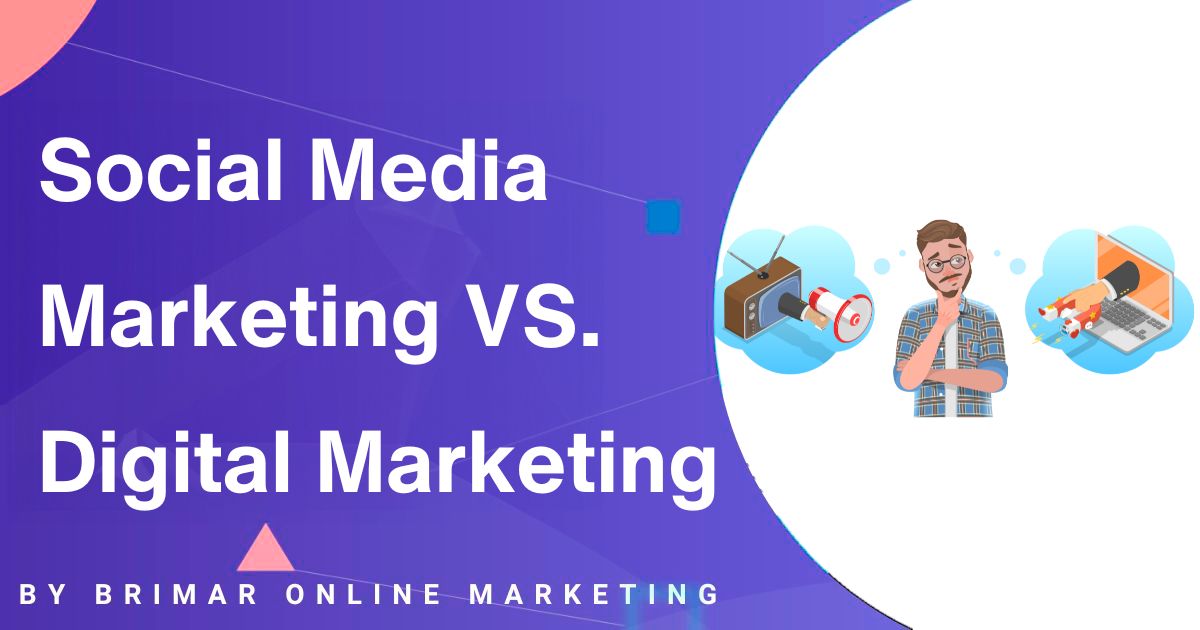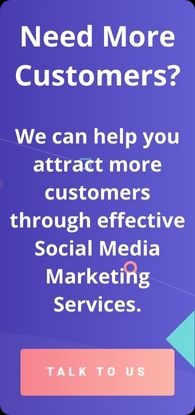
Marketing has come a long way, from traditional methods like print ads and billboards to the vast, interconnected world of digital marketing.
With so many options at our fingertips, it’s essential for businesses to pick the right strategy to reach their goals and connect with their audience.
This brings us to two key players in the game: social media marketing and digital marketing.
Let’s dive into what each of these entails and why they matter.
Understanding Digital Marketing
Digital Marketing – The Big Picture
Digital marketing is like the Swiss Army knife of the marketing world.
It’s an umbrella term that covers a wide range of tactics used to promote products or services through electronic devices and the Internet.
Think of it as the overarching strategy that includes everything from email marketing to search engine optimization.
Forms of Digital Marketing
- Email Marketing: This involves sending emails to a list of subscribers. It’s great for building relationships and keeping your audience informed about your latest offers and news.
- Search Engine Marketing (SEM): This focuses on increasing visibility in search engine results pages through paid ads. Google Ads is a popular tool for SEM.
- Content Marketing: Creating and sharing valuable content like blog posts, videos, and infographics to attract and engage a target audience. It’s all about providing value.
- Influencer Marketing: Partnering with influencers to promote your brand to their followers. It uses the influencer’s credibility and wide reach.
- Affiliate Marketing: Paying commissions to affiliates who bring in new customers through their marketing efforts. It’s a performance-based approach.
- Mobile Marketing: Reaching your audience through their mobile devices via apps, text messages, and mobile-optimized websites.
Digital Channels and Platforms
Digital marketing utilizes various channels and platforms to reach potential customers:
- Search Engines: Google, Bing, and other search engines are critical for search engine optimization (SEO) and SEM efforts.
- Websites: Your website is your online storefront, a central hub for all digital marketing activities.
- Social Media: Platforms like Facebook, Instagram, Twitter, and LinkedIn are vital for social media marketing.
- Email: Email remains a powerful tool for direct communication and nurturing leads.
- Mobile Apps: Mobile apps offer a personalized experience and are excellent for engaging customers on the go.
Through these digital channels, businesses can create targeted and effective marketing campaigns that drive traffic, boost brand awareness, and increase sales.
Understanding the breadth and depth of digital marketing is the first step in crafting a successful marketing strategy tailored to your business needs.
Need a Sales Funnel that Converts?
Struggling to turn clicks into customers?
A high-converting sales funnel could be the missing link. We’ll help you build a simple, straightforward, and effective funnel that guides your visitors step-by-step, so they take action, not just browse.
What is Social Media Marketing?
Social media marketing is all about using social platforms to connect with your audience, build your brand, and drive engagement.
It’s the practice of creating and sharing content on social networks like Facebook, Instagram, X, and LinkedIn.
Each platform has its unique vibe and audience, making them powerful tools for reaching different segments of your target market.
Facebook, with its vast user base, is fantastic for creating a community and sharing various types of content, from videos to blog posts.
Instagram, known for its visual appeal, is perfect for sharing eye-catching images and short videos.
X is the go-to for real-time updates and engaging in conversations with followers, while LinkedIn is ideal for B2B marketing and professional networking.
A social media manager plays an essential role in this process.
They craft and curate content, schedule posts, and interact with the audience to keep engagement levels high.
They also analyze metrics to understand what works best and adjust strategies accordingly.
Using social media for brand awareness involves consistent and creative posting that resonates with your audience.
It’s about telling your brand’s story in a way that encourages people to follow, like, comment, and share.
Social media marketing isn’t just about pushing out content; it’s about fostering a community and building relationships with potential customers.
This ongoing interaction keeps your brand top-of-mind and creates loyal fans who are more likely to convert into customers.
Digital Marketing vs. Social Media Marketing

Social media marketing is crucial to digital marketing, but they are not interchangeable.
Digital marketing is a broader concept that encompasses all marketing efforts using electronic devices or the internet.
This includes email marketing, search engine optimization (SEO), search engine marketing (SEM), content marketing, and much more.
Social media marketing, on the other hand, focuses explicitly on activities within social media platforms.
One key difference is the scope.
Digital marketing covers a wide range of online channels and digital platforms, such as search engines, websites, email, and mobile apps.
Social media marketing zeroes in on social networks and platforms like Facebook, Instagram, X, and LinkedIn.
This specialization allows social media marketing to harness the power of social interactions and user-generated content.
In terms of strategies, digital marketing strategies are often more diverse.
For instance, SEO and SEM aim to increase visibility on search engines like Google.
Email marketing involves sending targeted messages to an email list to nurture leads and drive conversions.
Content marketing works by creating valuable content to attract and retain a clearly defined audience.
Social media marketing strategies, meanwhile, are more about engagement and interaction.
This includes creating engaging social media posts, running social media campaigns, and using social media ads to reach a larger audience.
The content shared on social media is often designed to be shareable and to spark conversations among users.
To sum it up, while social media marketing focuses on leveraging social platforms to build brand awareness and foster customer engagement,
digital marketing takes a broader approach by utilizing various digital channels to achieve marketing goals.
Both are essential components of a comprehensive digital marketing strategy, working together to drive brand visibility, website traffic, and, ultimately, conversions.
Digital Marketing Strategies

Alright, let’s dive into some strategies that can make your digital marketing efforts shine.
An Overview of Effective Digital Marketing Strategies
Digital marketing is all about using various online platforms to reach your target audience and achieve your business goals.
It’s like having a toolbox filled with different tools, each designed for a specific purpose.
The key is knowing which tools to use and when.
Search Engine Optimization (SEO) and Search Engine Marketing (SEM)
SEO is focused on improving your website’s ranking in search engine results.
Think of it as optimizing your site so search engines like Google can easily find and understand your content.
This involves using relevant keywords, creating high-quality content, and making sure your website is user-friendly.
SEM, on the other hand, involves paid strategies to increase your website’s visibility on search engines.
This includes pay-per-click (PPC) ads.
Both SEO and SEM are crucial for driving traffic to your site and attracting potential customers.
Email Marketing and Email Campaigns
Email marketing is an effective method for directly reaching your audience.
Building an email list allows targeted messaging, updates, and promotions to reach subscribers’ inboxes,
fostering leads, driving sales, and maintaining engagement.
Use of Google Ads and Google Analytics
Google Ads allows you to create targeted ads that appear on Google’s search results and other Google-affiliated sites.
It’s a great way to reach people who are actively searching for products or services like yours.
Google Analytics, meanwhile, helps you track and analyze your website traffic.
It’s like having a behind-the-scenes look at how visitors are interacting with your site.
You can see which pages are most popular, where your traffic is coming from, and how well your marketing campaigns are performing.
Online Advertising and Online Marketing Channels
Online advertising encompasses a variety of platforms, including social media, display ads, and video ads.
The key is to ensure that your message reaches the intended audience.
Leveraging different online marketing channels can reach a larger audience and drive more traffic to your site.
Five Social Media Marketing Strategies
Now, let’s talk about how you can make the most out of social media marketing.
It’s more than just posting a few updates;
it’s about creating meaningful connections and engaging with your audience.
1. Effective Social Media Marketing Strategies
Social media marketing involves using platforms such as Facebook, Instagram, X, and LinkedIn to promote your brand and engage with your audience.
The goal is to create content that resonates with your followers and encourages them to interact with your brand.
2. Social Media Posts and Social Media Campaigns
Creating engaging social media posts is essential.
These can be anything from text updates and images to videos and stories.
The key is to be consistent and provide value to your audience.
Social media campaigns, on the other hand, are coordinated efforts to achieve a specific goal, like launching a new product or promoting a sale.
3. Use of Social Media Ads and Influencer Marketing
Social media ads allow you to target specific demographics and reach a wider audience.
Whether it’s Facebook ads, Instagram-sponsored posts, or X-promoted tweets, these ads can drive traffic and boost brand awareness.
Influencer marketing involves partnering with popular social media personalities who can promote your brand to their followers.
It’s a great way to reach a larger audience and build credibility.
4. Best Practices for Social Media Marketing Campaigns
When running social media campaigns, it’s essential to set clear goals, know your target audience, and create compelling content.
Engage with your followers by promptly responding to comments and messages.
Vigorously monitor your campaign’s performance and make necessary adjustments to your strategy.
5. Social Media Management and Social Media Channels
Managing your social media accounts effectively is crucial.
This includes planning and scheduling posts, engaging with your audience, and analyzing your performance.
Each social media channel has its own unique features and audience, so it’s important to tailor your content accordingly.
Five Advantages of Digital Marketing
Digital marketing offers a treasure trove of benefits that can transform your business.
Let’s dive into some of the key advantages.
1. Reaching a Wider Audience and Target Market
Digital marketing allows you to cast a wide net and reach a global audience.
Whether you’re a small local shop or an international brand,
digital channels help you connect with people who are interested in your products or services, no matter where they are.
2. Increased Brand Visibility and Online Presence
With digital marketing, your brand can be everywhere your audience is.
From search engines to social media platforms, being present across various digital channels enhances your brand visibility.
This constant presence builds trust and recognition, making your business a go-to option for potential customers.
3. Effective Tracking and Analytics
One of the coolest things about digital marketing is the ability to track and analyze your efforts.
Tools like Google Analytics let you see how many people visit your site, where they come from, and what they do once they’re there.
This data helps you understand what’s working and what needs tweaking, ensuring you get the most out of your marketing budget.
4. Cost-Effective Solutions for Small Businesses
Digital marketing levels the playing field, giving small businesses a fighting chance against more prominent competitors.
Online advertising, social media campaigns, and email marketing can be done on a budget, allowing you to reach your audience without breaking the bank.
5. Enhanced Customer Data and Targeting
Digital marketing provides a wealth of customer data that can be used to refine your strategies.
By understanding your audience’s preferences, behaviors, and demographics, you can create targeted campaigns that resonate with them.
This precision targeting increases the likelihood of conversions and builds stronger relationships with your customers.
Five Advantages of Social Media Marketing
Social media marketing isn’t just about posting pictures and updates; it’s a powerful tool that can propel your business to new heights.
Here’s why it’s so effective.
1. Direct Interaction with Potential Customers and Brand Recognition
Social media platforms offer a unique opportunity to interact directly with your audience.
You can respond to comments, answer questions, and engage in conversations that build brand recognition and trust.
This direct interaction humanizes your brand and fosters a loyal community.
2. Real-Time Engagement and Feedback
With social media, you get immediate feedback on your posts, campaigns, and products.
This real-time engagement allows you to gauge public sentiment, address issues promptly, and adapt your strategies on the fly.
It’s a dynamic way to stay connected with your audience and keep them engaged.
3. Increased Brand Awareness Through Social Networks
Social media is a fantastic way to increase brand awareness.
Consistently sharing valuable content keeps your brand top-of-mind for your audience.
As they engage with your posts, their network sees it, too, amplifying your reach and introducing your brand to new potential customers.
4. Cost-Effective and Powerful Tool for Business Owners
For business owners, social media marketing is a cost-effective powerhouse.
You don’t need a massive budget to make an impact.
Creative posts, engaging stories, and targeted ads can all be done within a reasonable budget, providing great returns on investment.
5. Building a Community of Loyal Followers and New Customers
Social media helps you build a community around your brand.
Sharing your story, values, and behind-the-scenes glimpses creates a sense of belonging among your followers.
This loyal community not only supports your brand but also advocates for it, bringing in new customers through word-of-mouth and shared content.
Both digital and social media marketing offer incredible opportunities to grow your business, each with its unique strengths.
By understanding and leveraging these advantages, you can create a robust marketing strategy that drives success.
Combining Digital Marketing and Social Media Marketing

Integrating digital marketing and social media marketing can significantly boost your marketing efforts.
Think of it like assembling a dream team where each player brings unique strengths to the table.
Digital marketing covers a broad spectrum of tactics, including email marketing, search engine optimization, and content marketing.
Meanwhile, social media marketing focuses on engaging with your audience on platforms like Facebook, Instagram, and X.
When these two strategies work together, they create a comprehensive plan that can reach a wider audience and drive better results.
Imagine running a digital marketing campaign that includes a mix of email marketing, SEO, and social media ads.
You can use social media to promote your blog posts, which not only drives traffic to your website but also helps with SEO.
Engaging content on social media can capture your audience’s attention,
leading them to sign up for your email list, where you can nurture them with valuable information and offers.
Successful examples of this integrated approach include brands like Nike,
which uses social media to promote its campaigns while simultaneously running Google Ads and optimizing its website for search engines.
This multi-channel approach ensures they are visible wherever their potential customers are, from search engines to social media platforms.
Balancing your marketing budget and efforts between digital and social media marketing is crucial.
To succeed, you must find the perfect combination that suits your brand and resonates with your audience.
Allocate a portion of your budget to each channel based on where your audience spends their time and which platforms drive the most engagement and conversions for your business.
Case Studies and Real-World Examples
Let’s take a look at some real-world examples to see how successful brands leverage both digital and social media marketing.
Coca-Cola’s Share a Coke Campaign
Coca-Cola’s “Share a Coke” campaign is a brilliant example of integrating social media with digital marketing.
They personalized bottles with popular names and encouraged customers to share photos of their personalized bottles on social media.
This user-generated content was then used in their digital marketing campaigns, creating a viral loop that increased brand awareness and engagement.
Airbnb’s #WeAccept Campaign
Airbnb’s #WeAccept campaign utilized a powerful message of inclusion and shared it across various digital channels.
They launched the campaign with a Super Bowl ad, followed by social media posts and email marketing.
This comprehensive approach helped them reach a vast audience, increase brand visibility, and drive significant traffic to their website.
These examples highlight how combining digital and social media marketing can amplify your reach and effectiveness.
Coca-Cola and Airbnb successfully engaged their audiences, boosted brand awareness,
and drove substantial website traffic through their integrated campaigns.
Final Thoughts
We’ve explored the main differences and benefits of digital marketing and social media marketing.
Digital marketing offers a broad range of tactics to reach and engage your audience,
while social media marketing provides direct interaction and real-time engagement.
Both strategies have their unique strengths, and when combined, they create a powerful marketing force.
For business owners, it’s essential to assess your marketing goals and determine which channels will best help you achieve them.
Whether you’re looking to increase brand awareness, drive website traffic, or boost conversions,
a well-rounded approach that incorporates both digital and social media marketing is often the most effective.
The best way to achieve business success is to experiment, measure your results,
and adjust your strategies based on what works best for your audience.
Keep your marketing efforts dynamic and be willing to adapt to new trends and technologies.
With the right mix of digital and social media marketing, you can create compelling campaigns that resonate with your audience and drive meaningful results for your business.
Ready to get started?
Feel free to reach out.
Our Digital Marketing Services Have Helped Our Clients Increase Their Revenue!
“I highly recommend Brimar if your looking to grow your online business. You will be satisfied with the high level of expertise and high quality of services. It has helped my business grow by leaps and bounds.”
CEO
